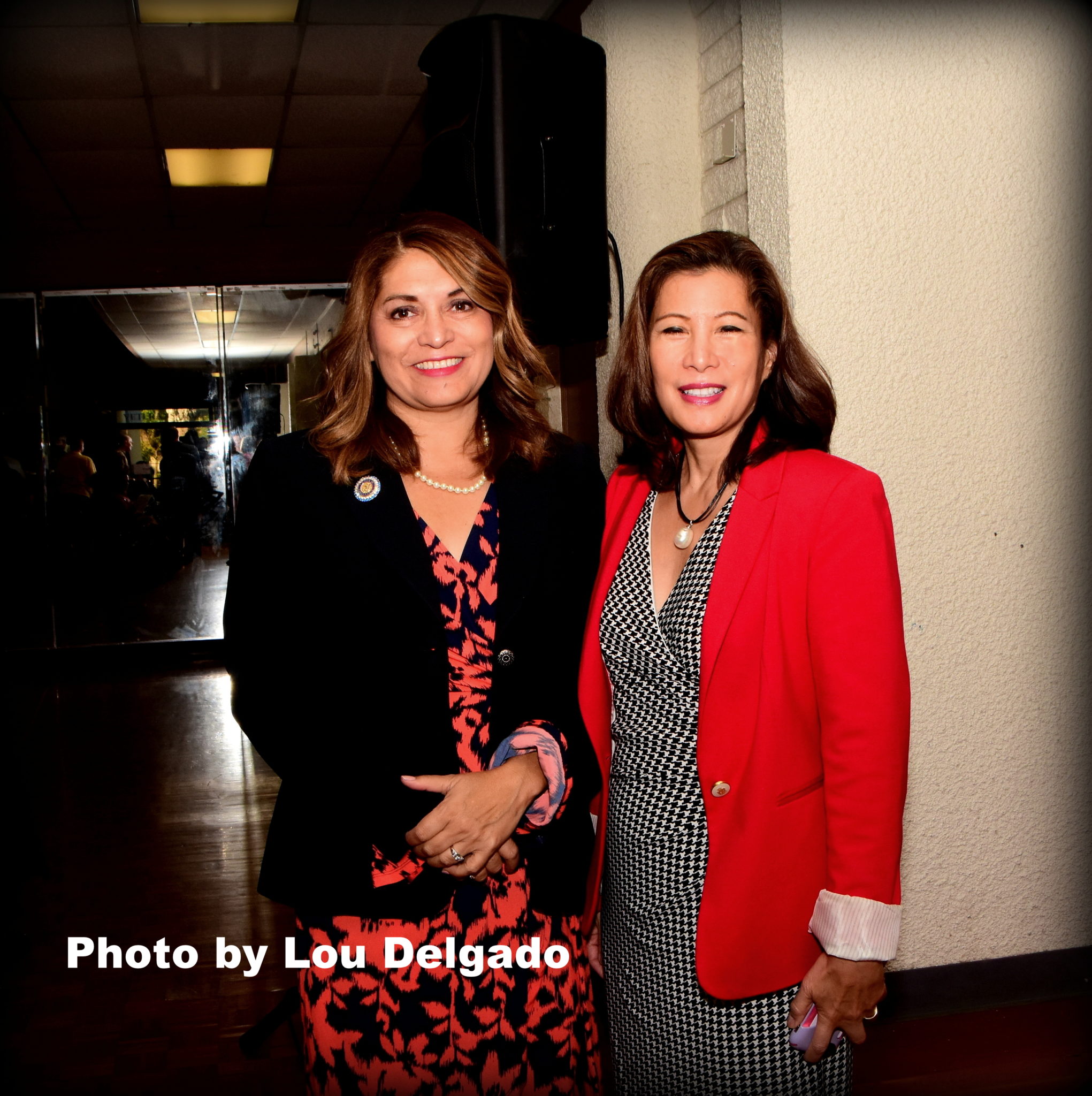

This is a contributed article by Larry Caballero; Currently Larry is on the OCDP Central Committee representing Rep. Linda Sanchez (ex officio). He is a retired teacher – who worked at Banning High School for 30 years; he taught English. He was also associated with the CTA serving on the policy board for many years. Currently he’s the co-president of the Hubert H Humphrey Democratic Club (Artesia-Cerritos-Hawaiian Gardens).
……
California State Assemblywoman Sharon Quirk-Silva, who represents North Orange County in the 65AD, held her third Breakfast Club meeting Oct. 27 to introduce the first Asian and the only second woman California Supreme Court Justice Tani Cantil-Sakauye.
The event was held at the Veterans Auditorium in Buena Park where Quirk-Silva shared Sacramento updates with local residents and thanked everyone for attending.
“I pledged to serve with a commitment to maintain an open and consistent dialogue with my constituents, and to that end I am once again hosting a Breakfast Club meeting for fellow community, local government, business and labor leaders in Orange County and the surrounding communities. This will allow us to have a firsthand perspective about the issues that are affecting our state.”
Chief Justice Sakauye was invited to share insights on what’s happening in California, both interesting and timely.
She began by thanking more than 60 residents in attendance for their civic interest and engagement, and “for showing up at 7:30 in the morning to hear me. Usually I don’t see these many people so early in the morning unless they are forced to be there.”
Los Angeles Times reporter Maura Dolan wrote recently that “as California’s top judge, she has no problem speaking her mind, calling on the Trump administration to keep its immigration agents away from state courthouses, and giving a highly publicized address that reflected California’s concerns with the new president.”
Sakauye decided to confront immigration policy after reflecting on the 75th anniversary of the internment of Japanese Americans.
“There were voices that spoke out against internment but not enough,” she said.
Her husband’s parents were among the more than 120,000 Japanese Americans removed from their homes and sent to live in camps for four years without their possessions.
At the same time she was listening to her in-laws’ personal stories, she was hearing constant reports of anxious immigrants showing up in California courthouses — starting in January, when President Trump took office — with worries.
“They wanted to know, “How can I protect my kids if I am deported? If I obtain a restraining order against a violent boyfriend, will immigration authorities be tipped off to my existence? My children were born in this country — can they stay if I am deported?”
Though immigration is the purview of federal courts, Cantil-Sakauye said it was “fundamentally unfair” that some people lacked access to information.
The result was an online immigration resources directory on the state court website.
Dolan wrote that judges told Sakauye that immigration agents were going into courthouses, intimidating immigrants there to testify or to deal with other legal matters.
A reception room in a dependency court in Southern California cleared out after someone said there was an agent in the building. Some immigrants stopped sending their children to school. “This was ongoing,” she said.
Cantil-Sakauye, mindful of a need to be impartial, did not want to appear to be critical of the law. She is a former prosecutor after all who put people in prison, and her husband is a retired police lieutenant.
In a letter to U.S. Atty. Gen. Jeff Sessions and former Homeland Security Secretary John Kelly, she asked that immigration agents stop “stalking” immigrants here illegally at California’s courthouses. “Courthouses should not be used as bait in the necessary enforcement of our country’s immigration laws,” she wrote. The chief justices of Oregon, Washington and New Jersey later endorsed her stance. She called Trump’s criticism of federal judges “very threatening to the third branch of government.”
Her views received national coverage, and Sessions and Kelly admonished her in a letter for using the word “stalking,” and told her to take her concerns to Gov. Jerry Brown.
“I think they intended to scold me,” she said, “but I have been in law for more than 30 years, and I am used to being scolded.” The Washington Post declared that Cantil-Sakauye was “fast emerging as one of the Trump administration’s most vocal critics in the judiciary” — a description she said made her “uncomfortable.”
She received an ugly message on her voicemail and threatening emails, which she reported to the California Highway Patrol, the agency in charge of her protection.
Still, she continued to speak out. Dolan wrote that in her annual state of the judiciary address to the Legislature in March, Sakauye warned that the rule of law was being threatened and should not be taken for granted. Though she never uttered the name Trump, most observers thought it was about him.
“The rule of law means that we as a people are governed by laws and rules, not by a monarch,” she said. She no longer hears of immigration agents lurking in courthouses, she said, “but I just don’t know if they are simply regrouping and replanning.”
The justices have sided with environmentalists, open-government advocates and workers in some cases, deferred to the Legislature and the governor in others and upheld most, but not all, death penalty cases. Sakauye has served on the Supreme Court since 2011, when she was nominated by Governor Schwarzenegger, and is part of the judicial branch “that is a co-equal branch of government.”
More than 6,000 pieces of legislation were passed last year and signed by Governor Brown, “and each piece has to come before the courts before it can become law to ensure that it is constitutional.”
She said the California judicial branch is the largest and most diverse in the world with more than 2,000 judges representing about 39 million Californians, and it does this with limited resources.
The California Supreme Court consists of seven judges, who cannot hear all cases, and usually concentrate on murder and conflict cases, as well as those that will have a significant impact on society.
“Yet we’re not policy makers or politicians,” Sakauye said. “We are neutral.” As Chief Justice, she wears three hats: she is first among equals who assigns cases and manages and supports the court; the presiding judge on the California Judicial Council that hears complaints about the courts and addresses civic initiatives.
Although immigration is a federal issue, Sakauye and her colleagues initiated the immigration resource directory website that consists of information and resources that include location of immigration offices, attorneys and law schools that provide services.
The Court is also studying the pros and cons of a for-profit bail system that adversely impacts poor and working class families. It has become a $300 million per year industry, and only the Philippines and the United States still allow it.
“The Court’s mission is primarily to allow equal access to all Californians who speak more than 200 languages and dialects,” said Sakauye, “and the Judicial Council have launched far-reaching reforms with a vision for improving the public’s access to justice, while building strong partnerships to lead California’s judicial branch out of the worst fiscal crisis since the Great Depression.”
Although the judicial branch is dynamic, it is a quiet one that shuns publicity. “Yet our doors are wide open for everyone,” said Sakauye.
The recent recession did impact the court system when it was necessary to do more with less funding. Since 2008, it has suffered more than $1 billion in lost revenues.
“Even so, don’t forget, everything you read in the newspaper either is in or will be in Court.”
